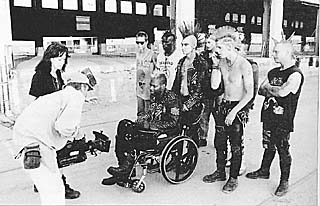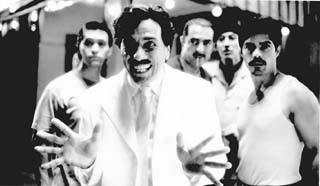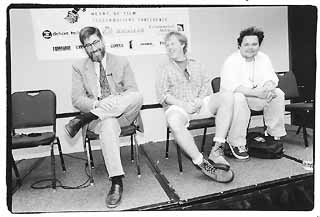https://www.austinchronicle.com/screens/1998-10-09/520414/
From Script to Screen
October 9, 1998, Screens
THE DECLINE OF WESTERN CIVILIZATON, PART III
Dir: Penelope Spheeris; Prod: Scott Wilder.

Far from treading the seriocomic ground covered in the first two outings in Spheeris' ongoing documentary of the Los Angeles punk and metal scenes, this third installment packs a chilling emotional wallop. Focusing on the homeless street punks who spend their days spare-changing on Melrose and their nights squatting abandoned buildings, this is more an indictment of a shattered social infrastructure than just another punk rock doc. Spheeris paints an unflinching picture of kids in hell, fueled by a common love of hardcore music and an endless diet of beer and loathing. Decline III veers from humor to horror and back again, with the occasional aside from old-school scenesters such as Black Flag/Circle Jerks frontman Keith Morris. It's more a wake-up call than anything else, but there are surprising moments of tenderness amidst the psychic carnage. Seamlessly edited and, above all, smart and compassionate, it's by far the best thing Spheeris has done since, well, Decline II.-- Marc Savlov
RESTAURANT
D: Eric Bross; Scr: Tom C. Cudworth; Prod: H. M. Coakley, Shana Stein, Eric Bross; with Adrien Brody, Elise Neal, Malcolm Jamal Warner, David Moscow, Simon Baker-Denny, Catherine Kellner, John Carroll Lynch, Lauryn Hill.
|
|
SHORTS 1
D: Various.
Shorts 1 was dominated by student films in which, by nature, exuberance generally has to battle technical limitations. But part of the draw of shorts is to see how and where they get beyond those boundaries. A good joke is a good joke, as in Greg Pak's "Po Mo Knock Knock": "Knock Knock." "Who's there?" "Jacques Derrida" "Jacques Derrida who?" "Precisely." And a good premise is a good premise, as in the Monty Pythonesque gaffe of Lyn Elliot's "Cat Fight" in which a girl accidentally pulls the tail off of her boyfriend's cat. Some shorts succeeded despite their limitations. The deadpan narration gave a humorous edge to Christopher Meister's charming but overacted "Seventh Heaven." Some were slain on their limitations. Doing a turn-of-the-century period piece (Marygrace O'Shea's "Ellis Island," for example) is not a good idea. Others just succeeded, period. "Sound Sleep" by Pagan Harleman is a marvelously constructed emotional piece about an aging husband and wife who are separated by necessity after the husband's health fades.
-- Michael Bertin
BLOOD SIMPLE: FOREVER YOUNG
D: Joel Coen; Scr: Joel and Ethan Coen; Prod: Ethan Coen; with Frances McDormand, Dan Hedaya, John Getz, M. Emmet Walsh.
The buzz, the lights, the crush of bodies queued outside the Paramount, all focused on one thing: the Coens' "remastered/re-edited" take on their 1984 indie classic of neo-noir nastiness. For those, like myself, who haven't rescreened the film since the mid-Eighties, it was difficult to say what, if anything, was so dramatically different. Certainly few of the performances -- from Walsh's achingly sleazy private dick named Visser to McDormand's understandably unfaithful Abby -- were affected by the minor cuts and revisions, and though the sound and print may have been pumped up thanks to beneficial hindsight, the Paramount's less-than-stellar acoustics rendered the differences negligible. Blood Simple remains, of course, one of the most influential of all indie films, whether in this new, streamlined format, or the slightly muddier prints of yore. The most mind-boggling scene, however, was the panicky crowd outside, dressed not to the nines but to the elevens, and desperate to get inside and secure the precious tenth-row center seats. That says more about the Coens' sphere of influence than any re-editing ever could. -- Marc Savlov
TEMPORARY GIRL
Dir/Prod: Lisa Kotin, Johnny White; Scr: Lisa Kotin; with Lisa Kotin, David M. Pasquesi, Scott Adsit.
In reference to his own tune "Shiftless When Idle" Paul Westerberg of the Replacements once commented something to the effect of: title great, song bad. Substitute the word "movie" for "song" and that same criticism applies to Temporary Girl. Written, directed, and produced by Lisa Kotin who also stars, Temporary Girl chronicles a work week in the life of Jeanette, a failing actress and 14-year temping vet, who at 40 is still waiting for her big break. The film suffers from one tiny little oversight: It lacks a story. The entire film moves from Jeanette learning that she's pregnant to her choice between her husband and baby or her career. The intervening 90 minutes slogs through a series of minor crises that are so dulling by the time Jeanette is finally forced to pick, there's only slight elation that the ordeal (i.e., the movie) is over. Save for one scene in which Jeanette's prima donna boss pulls a Lyndon Johnson in the bathroom, the best thing about Temporary Girl is the opening credits. -- Michael Bertin
THE WONDERFUL ICE CREAM SUIT
Dir: Stuart Gordon; Scr: Ray Bradbury; Prod: Roy E. Disney, Stuart Gordon; with Joe Mantegna, Edward James Olmos, Esai Morales.
|
|
Despite some unfavorable advance rumblings, this gentle adaptation of the story by Ray Bradbury is a keeper, catching the fantasist's lyrical twists and turns with sublime good humor. It's a direct-to-video release from Disney, which may strike some as strange seeing as how Gordon is the man behind H.P. Lovecraft's Re-Animator and the more recent Castle Freak (also showing in the festival), but the director -- working from Bradbury's own script -- gets it right with nary a drop of the red stuff in sight. As the leader of a quintet of poor dreamers who chip in to purchase a magical white suit that might fulfill their downtrodden desires, Mantegna is wryly marvelous. Likewise the rest of the smallish cast in this quiet, colorful slice of South of the Border melancholy. No exploding heads here, but plenty of heart and some genius set design from the men behind the Organic Theater Company and Ray "I'm still a kid, dammit" Bradbury. Neo-townie Sandra Bullock's "Making Sandwiches,"the opening short, was pure Venice Beach vérité: one half audience favorite and one half quirky indulgence. -- Marc Savlov
PANELS
|
|
Writers love this conference. Why? First, because for a weekend they get to stop being completely anonymous and instead get to sit on stage and be known as "the guy who wrote [blank]." So esteemed panelists across the weekend included notables like the guy who wrote Mr. Holland's Opus and Courage Under Fire (Patrick Sheane Duncan), the guy who wrote My Cousin Vinny and Ruthless People (Dale Launer), and the guy who wrote The Jerk and Jaws (Carl Gottlieb), as well as people with actual names, like John Landis and Paul Schrader. Second, writers love this because they get to talk about their favorite thing -- themselves.
And they would do it in a couple of ways so that no matter what the subject of the panel was, it invariably came back to two things. One: There is no standard way of doing this, where "this" is almost anything -- getting read, getting produced, getting an agent, even just getting your own script written. Then the writer would proceed to tell you how he or she did it. And that's where it got a little bizarre. One writer (and I'm pretty sure that it was Texas Monthly ex Bill Broyles) claimed that to get distance between him and his work, he would print out what he had written in 18-point type, get really far away from the piece of paper, then look at it through binoculars.
The other activity the panels always came back to was: "Let me tell you this funny story," almost always with the person telling the story as the hero and a movie star or director as the villain.
For example, Dale Launer had a little anecdote about how during the making of Dirty Rotten Scoundrels he got into an argument with Steve Martin over whether a particular visual gag was funny. Martin was supposed to act like he was humping a woman to whom he had just been introduced. Martin contended it was stupid, and to prove it he started mimicking the pelvic motion he would have to perform on camera. The entire crew, who were busy working on the set and had no idea what the argument was over, instantly busted out laughing at the sight of Martin doing this. Game, set, match, Launer. Of course, given the re-occurrence of the same people from panel to panel, I think I heard Launer tell that story on three separate occasions.
|
|
Only thing was, seated at my table was the wife of the guy who wrote Outbreak and Armageddon (Bob Poole) and she proceeded to pitch her sitcom idea to every writer who sat down. What was insane about this is that no sitcom or independent film writer could ever get this woman a deal. However, based upon who her husband was, she could have gotten meetings and lunches that most of the writers would have killed for. Peculiar.
Another of the roundtables, this one on pitching (akin to stuff in The Player: "It's like Out of Africa meets Pretty Woman) was one with a dozen or so producers set to attend. If you can actually smell desperation, then this room reeked worse than death row. All of the tables had filled out a good 20 minutes before the panel was scheduled to start.
Perhaps the single best spectacle of the conference panels was John Landis. If not insightful, he was at least entertaining, as he still had a kid's enthusiasm for his job and was refreshingly candid for someone of his stature. He flat out admitted, "Beverly Hills Cop III was a total whore job for me." The effervescent Landis even looked unlike the other panelists, who appeared generally worn and tired. Though, of course, every story he told was about himself. -- Michael Bertin
RHINOS
Dir: Randy Olsen; Scr: Chad Nell, Randy Olsen; Prod: Vic Feazell, Randy Olsen, Christi Allen, Tony Nasser, Michael Williams; with Chad Nell, Adam Warren, Kelly Coffield.
"Be a rhino," is the advice bellowed to them by the motivator who is training Mace and Brick to become thick-skinned perfume salesman. That career doesn't last although the advice does, as the two shiftless twentysomethings follow their fortunes into such varied occupations as sperm donors and house cleaners. The advice could well be extended to the audience who must endure prolonged episodes of aimless activity before getting to the occasional moments of nicely paced comedy. The Austin-based filmmakers (Randy Olsen, Chad Nell, and Adam Warren) seem to suffer from the same "get rich quick" delusions that plague the film's two heroes. More time developing the storyline instead of padding it out with such things as extended dry-heaving sequences might have better demonstrated the team's comic sensibilities and narrative ambitions. Rhino slackers like Mace and Brick are on nobody's endangered species list, however. Preceding the feature was Amy Talkington's short film "Second Skin," a workmanlike love story about a boy, a girl, and a snake. -- Marjorie Baumgarten
RUSHMORE
Dir: Wes Anderson; Scr: Wes Anderson, Owen Wilson; Prod: Barry Mendel, Paul Schiff, Wes Anderson, Owen Wilson; with Jason Schwartzman,Bill Murray, Olivia Williams, Brian Cox, Mason Gamble.
Wes Anderson and Owen Wilson have outdone themselves and all of their young Texas filmmaking counterparts (the Linklaters and Rodriguezes) to boot. Their Bottle Rocket follow-up, Rushmore, is absolutely exquisite. Everything about this film -- the plot, the characters, even the look -- teems with irreverent originality. A last-minute add to the festival, Rushmore tells the story of Max, an adolescent prodigy playwright who falls for his private school's Euro-comely, widowed first-grade teacher, and then loses his educational fast-track status after taking too much initiative in an attempt to impress her. There is no wasted motion, no misfiring (the opening gag's jab at Good Will Hunting is particularly brilliant), no unnecessary indulging, and the performances are universally perfect. The striking kid who plays Max (Jason Schwartzman) is an absolute wonder. Even Bill Murray turns in his first even and targeted effort in recent memory as the millionaire businessman befriended by Max. Unfortunately, you're going to have to wait until next year for the film's theatrical release, but, oh, it will be worth it. Rushmore is the Fargo of 1999 (only without the killing and the accents)-- Michael Bertin
SPIN THE BOTTLE
D: Jaime Yerkes; Scr: Amy Sohn; Story: Jaime Yerkes; Prod: Gill Holland, Holter Graham, Mitchell Riggs, Kim Winter, Jessica Faller, Heather Goldenhersh.
Five childhood friends get together for an adult reunion at one of their old haunts. Everyone's libido is still raging and old scores are about to be settled. The initial pleasantries make way for seething antagonisms, and before you can say "spin the bottle," flirtations are flying through the air, sucking blood from old wounds faster than mosquitoes in a blood bank. Director Jaime Yerkes' story (which was scripted by New York Press columnist Amy Sohn from a story idea by Yerkes) is smart and pointed and keeps the narrative surprises coming. At times it seems a little too forced and overly schematic, with dramatic troughs that might have been smoothed over with more challenging visual strategies and more assured acting. Yet the modestly financed Spin the Bottle is a diverting group study and not just another downsized Big Chill.-- Marjorie Baumgarten
CHOCOLATE FOR BREAKFAST
D: Emily Baer; Scr: Emily Baer, Brooke Hailey; Prod: Emily Baer, Brooke Hailey, Carl Mergenthaler; with Brooke Hailey, Callie Thorne, Josh Hamilton.
There's something to be said for doing it -- for writing the script, raising the money, organizing the talent, and putting the images onto film. In Chocolate for Breakfast, that's all you can say. Four young women, one apartment, no surprises. Writer-director Emily Baer has gone to absolutely zero lengths to avoid predictability, even pulling her characters straight from the stereotype boilerplate. Casey is the starving artist. Jess is the lawyer gonnabe with the lawyer gonnabe boyfriend. Amy is the overworked stockbroker. And Nina is the charming, med school-bound klutz who has never had an orgasm, appropriate for a movie that has no climax. Baer may have forgotten the overbearing Jewish mother, but she did include a cache of stupid and misogynistic men in unsupporting roles. The main characters might be a little more likable if it weren't so easy to visualize these same women in five years agonizing over what color their Porsche should be. The movie was fronted by the Sofia Coppola short "Lick the Star," the existence of which can be summed up in two words: "nepo" and "tism."-- Michael Bertin
AFFLICTION
D: Paul Schrader; Scr: Paul Schrader, based on novel by Russell Banks; Prod: Linda Reisman; with Nick Nolte, Sissy Spacek, James Coburn, Willem Dafoe.
The affliction referred to in the title of Paul Schrader's new film (which Schrader scripted from a novel by Russell Banks) is hardly your standard pop disease of the week. The affliction referred to here is the legacy of male violence and its descent through the generations. Nick Nolte delivers a stirringly dark and brooding performance as the story's central character Wade Whitehouse, a performance that's sure to be noticed at Oscar time. Supporting him are James Coburn as the ill-tempered father, Willem Dafoe as the brother who thinks he has escaped the consequences of his father's rage, and Sissy Spacek as the girlfriend with whom Wade repeats all the mistakes of his first marriage. It's a stark emotional and artistic statement, and Wade Whitehouse takes his place among the vast panoply of Schrader characters (Taxi Driver, Raging Bull, Mishima, Mosquito Coast, Old Boyfriends, and even The Last Temptation of Christ) whose behaviors are governed by their obsessions or their mistaken directions in life. Much more will be said about this movie when it is released at the end of the year.
What made this evening's presentation of Affliction so uniquely memorable was the serendipitous result of a scheduling snafu that had the bulk of the audience in the theatre a full hour to half hour before the movie was due to begin. There to make his introductions and not wanting to lose the crowd's good will even before the movie began, Schrader rose to full showmanship mode and took the stage to schmooze the audience for an entire half hour. Not wanting to discuss the movie at hand before anyone had seen it (no, he came back at 1am to conduct another Q&A following the film), Schrader fielded questions on everything and anything from his meditative Mishima (which he reflected on for nearly 10 minutes), to his analysis of the current film industry (It's a "four-legged beast" made up of artists, film financiers, audiences, and critics, and in his view all four legs are "enfeebled" at this time), his opinion of Peter Biskind's much-publicized book scandals, Easy Riders, Raging Bulls ("It's the revenge of the celebrity culture on the counterculture"), and his thoughts on Titanic ("You'd get my eight bucks to rebuild that boat," he laughed while explaining how Cameron uses "the new bottle of technology to repackage old romanticism," thus creating hope that "all is not cynicism." Moreover, "Titanic brought a lot of money into the film community," which is good for everyone because eventually "some of it seeps out to people like me"). This freewheeling half-hour and the Q&A that followed the film screening was like an unscheduled master class, chock-full of lessons and observations that weren't listed in the course schedule.-- Marjorie Baumgarten
WENT TO CONEY ISLAND ON A MISSION FROM GOD ... BE BACK BY FIVE
D: Richard Schenkman; Scr/Prod: Jon Cryer, Richard Schenkman; with Jon Cryer, Rick Stear, Rafael Baez, Ione Skye, Frank Whalley.
The title of director and co-writer Richard Schenkman's second feature film refers to a code that lifelong buddies Daniel (Jon Cryer) and Stan (Rick Stear) used when they played hooky from school. This time, the underachieving, borderline alcoholic Stan claims to have acquired fourth-hand knowledge of the whereabouts of the duo's long-lost childhood buddy-for-life. He is now a mentally ill, homeless person wondering Coney Island. Whatstarts as promising quickly becomes laborious once the purpose of the more grown-up version of the mission becomes clear. Then the storytelling gives way to pontificating, and Schenkman, who co-wrote the screenplay with Cryer, falls in love with his own word-processing application. There is simply too much dialogue to make too few points. The film's pallid, washed-out look effectively connotes the desolate feel Schenkman is going for and Ione Skye, although underutilized, turns in a sharp performance, but missions from God shouldn't be this arbitrary and the corresponding revelations shouldn't be so plain.-- Michael Bertin
SNAKE TALES
Dir/Scr/Prod: Francesca Talenti; with Amalia Stifter, Rupert Reyes Jr., Lori Heuring, Jill Parker-Jones, David Blackwell, William T. Sutherland, Fred Wills, Irene Gonzales.
|
|
UT film professor Francesca Talenti's Snake Tales wants to be the narrative equivalent of a snake's journey through the grass: a slithery, circuitous affair that's a challenge to grab hold of or pin down in any one place. Snake Tales' storyline is a metaphorical three-ring circus of herpetological delights (or a Texas-tinged tribute to The Arabian Nights) as seemingly disparate characters and narrative threads gradually snake toward cohesion. Initially, the story elements flit through the viewer's consciousness something like one of those beer or perfume commercials that provide snatches of storylines but no convergence or resolution. Yet delightful performances, crisp camerawork, amusing musical counterpoint, and genuinely funny writing turn Snake Tales into so much more than another sterile exercise in narrative experimentation. Its colorful characters and strong sense of place manage to keep our attention even when we're not exactly sure what's going on. They remind us that the real pleasure is in the act of storytelling itself and not in the end result. Snake Tales ultimately wends its way toward a pleasantly loopy cohesion, though whether anything story-wise has been radically reconstructed is up for question. To paraphrase Freud: Sometimes a snake in the grass is just a snake in the grass-- Marjorie Baumgarten
SHORTS 2
D: Various.
While the Ritz Upstairs perfectly lends itself to omnibus screenings of short films, the odd running times, technical glitches, and assorted other snafus made for an occasionally confusing night. Was this Shorts Showcase 1 or 2 I had wandered into? Between the grainy black-and-white flickers and sporadic audio outages, even the best short films seem to run together after a while. Not so for Andrew Halasz's documentary "Gluegun Girl: A Documentary," which managed to be at once bizarre and wildly entertaining and proved once again that no matter what festival you may be at, documentary filmmakers are producing some of the most engaging work around. Other entries -- Carlos Lowenstein's "One Night and a Day," for example -- proved comic existentialism is still a hallmark of fledgling filmmakers while leaving room for some genuine guffaws. And then, of course, there are those shorts that act as a film school cri de coeur, such as Caroline Neal's "O for the Wings," which plumbed the depths of metaphysics, despair, and angsty ill-humor, replete with junior femme soothsayers. Drink deep from the well of bitter tears, indeed
-- Marc Savlov
Copyright © 2024 Austin Chronicle Corporation. All rights reserved.





